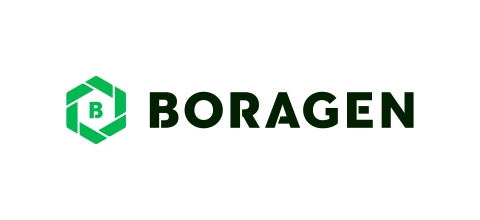Boragen Collaborates With Leading Universities to Extend the Benefits of Its Boron-based Platform Across Agriculture, Animal Health and Human Health
Boragen Collaborates With Leading Universities to Extend the Benefits of Its Boron-based Platform Across Agriculture, Animal Health and Human Health
RESEARCH TRIANGLE PARK, N.C.--(BUSINESS WIRE)--Boragen, Inc., a world-leading boron-based discovery platform, today announced that the company has partnered with the University of Toronto, University of Vermont and University of California, San Francisco to further its mission of creating innovative solutions based on the unique properties of boron-based chemistry.
“Boron continues to surprise us on a regular basis, and integration of boron into a molecular design often imparts unique chemical and biological properties,” said Dr. Tony Liu, CSO and Co-Founder of Boragen. “In fact, this is what excites our scientists the most: postulating potential applications and uncovering new mechanisms of action.”
While each individual collaboration represents a different application of Boragen’s discovery platform, together the projects provide an opportunity to gain a better understanding of boron chemistry. Further, the commonality across these collaborations is to leverage boron’s ability to access new mechanisms of action to control diseases, as demonstrated in recent publications.
University of California, San Francisco
In collaboration with University of California, San Francisco, Boragen looks to discover novel therapies that provide effective control for the protozoan parasite Plasmodium, the causative agent for Malaria. According to the Center for Disease Control and Prevention, in 2017 there were an estimated 219 million cases of malaria worldwide, with 435,000 deaths occurring mostly in children in Africa. “Recent research data have shown that boron chemistry is a promising source of novel antimalarial drugs,” said Dr. Philip Rosenthal, Professor, Dept. of Medicine. “We look forward to working with Boragen to explore the potential of this class of compounds.”
University of Vermont
Separately, Boragen is working with Dr. Christopher Huston at the University of Vermont to find a more effective solution to control Cryptosporidium parvum in cattle. This protozoa is responsible for diarrhea in calves, and results in slower growth rates and increase in the cost of labor, which causes an economic burden in the dairy industry. There are very limited treatment options available, but the company aims to address this with the same antiprotozoal boron technology being applied to malaria.
University of Toronto
Together with Dr. Leah Cowen’s research group at the University of Toronto, Boragen aims to answer a key fundamental question, and scope out the new biological targets that can be accessed through boron chemistry. One of Boragen’s core focuses is in developing novel fungicides for crop protection. Fungal pathogens of plants pose a serious threat to global food security, contaminating food supplies and causing epidemics in staple crops that feed billions, as well as producing cancer-causing toxins.
“Since one of the most widely-deployed fungicide classes are also used in medicine, resistance is a major global health threat. There is an urgent need to develop novel fungicides with distinct MOAs from antifungals used in medicine,” said Dr. Cowen.
“While each of these endeavors addresses a different application, together they demonstrate the far-reaching potential of boron chemistry, including to pressing issues that are often less visible to those in the developed world,” added Dr. Liu.
ABOUT BORAGEN
Boragen, founded in 2015 by world-renowned experts in boron chemistry, is headquartered in Research Triangle Park, North Carolina. The company utilizes boron’s unique properties to design and develop novel solutions targeting needs in crop protection, animal health and human health. To date, the company has developed a unique boron-based screening library targeting diverse biological applications. For more information visit www.boragenbio.com.
ABOUT THE UNIVERSITY OF TORONTO (U of T)
Founded in 1827, the University of Toronto is Canada’s leading institution of learning, discovery and knowledge creation. U of T is one of the world’s top research-intensive universities, driven to invent and innovate. It is also one of the top ten universities in the world for its startup incubator programs. In the last 10 years, the U of T entrepreneurship community has created over 500 companies and raised over $1.5 billion in investment capital.
ABOUT THE UNIVERSITY OF CALIFORNIA, SAN FRANCISCO (UCSF):
The University of California, San Francisco (UCSF) is exclusively focused on the health sciences and is dedicated to promoting health worldwide through advanced biomedical research, graduate-level education in the life sciences and health professions, and excellence in patient care. UCSF Health, which serves as UCSF's primary academic medical center, includes top-ranked specialty hospitals and other clinical programs, and has affiliations throughout the Bay Area. Learn more at https://www.ucsf.edu, or see our Fact Sheet.
Follow UCSF
ucsf.edu | Facebook.com/ucsf | YouTube.com/ucsf
ABOUT THE UNIVERSITY OF VERMONT (UVM)
Since 1791, the University of Vermont has worked to move humankind forward. Today, UVM is a top 100 research university of a perfect size, large enough to offer a breadth of ideas, resources, and opportunities, yet small enough to enable close faculty-student mentorship across all levels of study, from bachelor’s to M.D. and Ph.D. programs. As one of the nation’s first land grant institutions, UVM provides education and experiences that are enriched by our location—from the energy and innovation of Burlington to the forests, farms, and independent spirit of Vermont. UVM provides students endless ways to explore the world, challenge ideas, and dig in on the most pressing issues of our time.
Contacts
Kristi Lee-John, 919-270-8054
klee@crossroadsb2b.com
